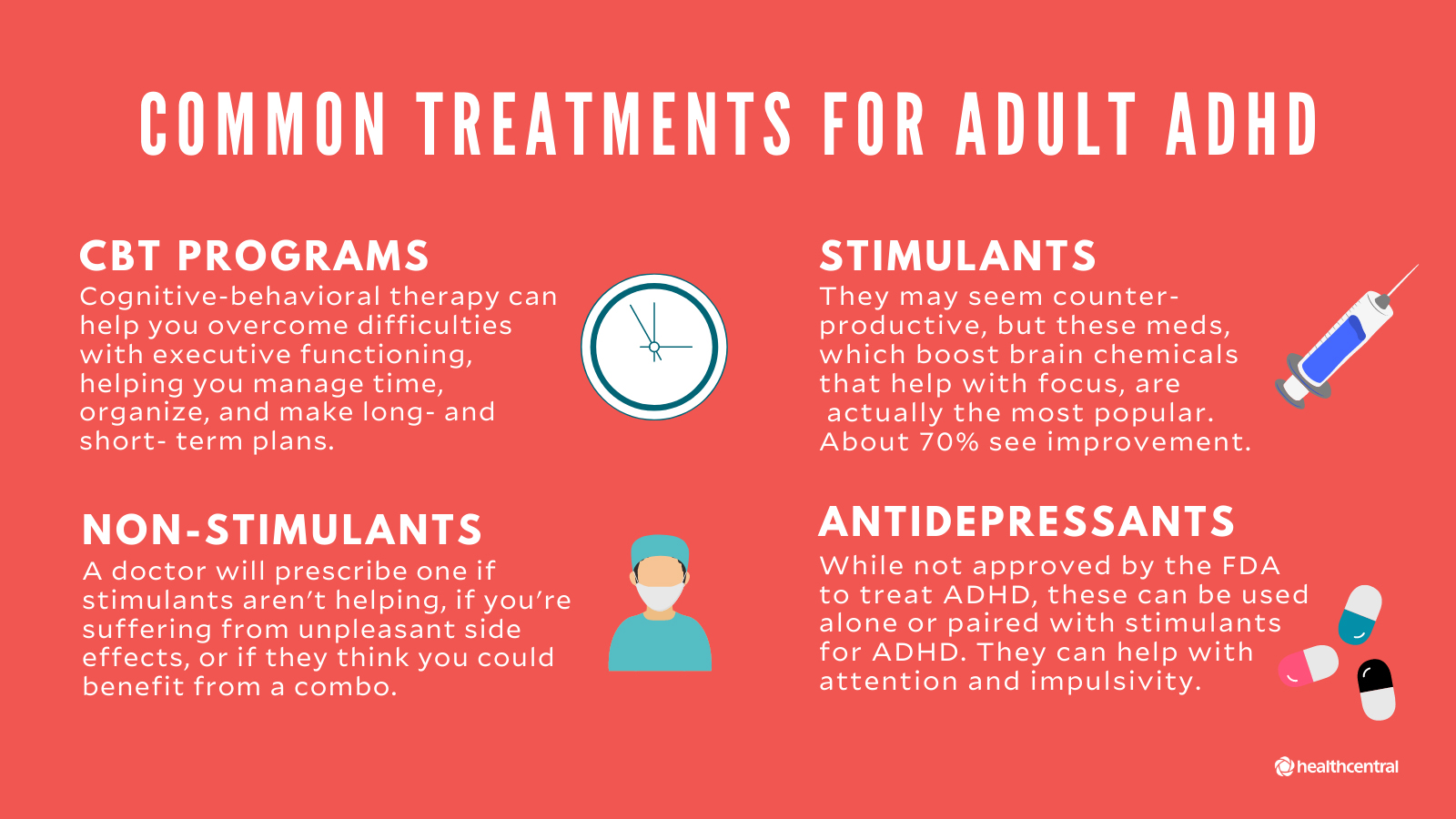Discovering Reliable ADHD Treatment Options for All Ages
The intricacies of Interest Deficiency Attention Deficit Disorder Condition (ADHD) present distinct difficulties across different age groups, necessitating an extensive exploration of effective therapy alternatives. A mix of behavioral therapies, pharmacological interventions, and lifestyle alterations has actually shown promise in resolving the varied needs of people with ADHD.
Comprehending ADHD and Its Influence
Attention-Deficit/Hyperactivity Condition (ADHD) is a neurodevelopmental condition defined by consistent patterns of inattention, attention deficit disorder, and impulsivity that can significantly influence different aspects of an individual's life. It usually materializes in youth, although symptoms can linger right into their adult years. The core symptoms of ADHD can interfere with academic performance, prevent social communications, and complicate job-related undertakings.
Individuals with ADHD often fight with preserving concentrate on tasks, arranging tasks, and following up on directions, which can lead to scholastic underachievement (Depression Treatment). In social contexts, impulsivity may lead to difficulties in forming and sustaining connections, as people may disrupt conversations or make rash decisions without considering effects
Furthermore, ADHD can co-occur with various other psychological health conditions, such as stress and anxiety and depression, even more complicating medical diagnosis and therapy. The irregularity in symptom presentation suggests that ADHD can impact people differently, necessitating an individualized strategy to management. Understanding ADHD's complex impact is important for creating reliable approaches that sustain people in browsing day-to-day challenges and achieving their capacity. Comprehensive awareness of ADHD's nature and ramifications prepares for checking out appropriate therapy options customized per person's demands.
Behavioral Therapies for ADHD
Numerous behavior therapies have actually been established to properly resolve the challenges connected with ADHD, focusing on customizing particular behaviors and cultivating essential abilities. Among the most identified techniques are cognitive-behavioral therapy (CBT), moms and dad training, and social abilities training.
CBT helps people determine and alter negative idea patterns and behaviors, promoting a more favorable outlook and boosted self-regulation. This therapy often consists of useful strategies for taking care of impulsivity and improving company. Moms and dad training programs equip caretakers by furnishing them with techniques to strengthen positive habits and established constant boundaries, which can be specifically advantageous for youngsters with ADHD.
Social skills training is one more important component, mentor individuals with ADHD how to interact successfully with peers - Depression Treatment. This approach frequently involves role-playing and responses to boost interaction, collaboration, and problem resolution skills
Integrating these behavior modifications right into a comprehensive treatment strategy can significantly enhance operating and lifestyle for people with ADHD. Inevitably, the effectiveness of these therapies depends upon customized strategies that take into consideration the one-of-a-kind needs of each individual, therefore fostering resilience and versatility in daily life.
Medicine Options Available
For several individuals with ADHD, medication can play a considerable function in handling signs and symptoms and boosting general performance. The two main groups of medicines recommended for ADHD are energizers and non-stimulants.
Energizers, such as methylphenidate and amphetamine-based medications, are the most typically utilized treatments. These medications work by boosting the degrees of neurotransmitters, especially dopamine and norepinephrine, in the brain, which helps improve attention and decrease impulsivity and hyperactivity. They typically generate quick outcomes, making them a favored choice for numerous clients.

It is essential for healthcare suppliers to perform a detailed analysis to determine the most appropriate medication important link based on individual needs, medical history, and prospective negative effects. Routine follow-up and tracking are likewise important to make sure the efficiency of the selected treatment and to make any type of required modifications.
Lifestyle Changes to Consider
Managing ADHD efficiently prolongs beyond medication, as lifestyle adjustments can significantly boost total wellness and sign control. Integrating structured regimens is critical; regular routines help people with ADHD handle their time efficiently and decrease sensations of bewilder.
Routine exercise is an additional crucial element. Workout not just helps to boost focus however also enhances mood and reduces stress and anxiety degrees. Tasks such as yoga exercise or group sporting activities can be particularly valuable, advertising both fitness and social communication.
Nourishment also plays a pivotal function. Depression Treatment. A balanced diet regimen abundant in omega-3 fatty acids, entire grains, and lean proteins can add to improved emphasis and cognitive function. Restricting sugar and processed foods is suggested, check out this site as these can aggravate hyperactivity and impulsivity
Sleep hygiene is necessary for managing ADHD signs. Developing a normal sleep routine and developing a restful atmosphere can boost rest quality, causing better attention and psychological law.
Alternative and Holistic Methods
Alternate and all natural strategies to ADHD treatment use a diverse series of options that enhance conventional methods. These approaches typically concentrate on way of life alterations, nutritional interventions, and restorative practices that intend to improve general wellness while resolving ADHD signs and symptoms.

Mindfulness and behavior modifications are likewise getting grip as holistic interventions. Practices such as yoga, meditation, and cognitive-behavioral therapy can cultivate self-regulation and improve interest. These approaches support emotional resilience, which is especially helpful for people with ADHD.
Organic supplements, such as ginkgo biloba and ginseng, are sometimes explored; however, it is important to seek advice from medical care specialists prior to including these right into therapy plans. While alternative and alternative methods can supply useful support, they ought to ideally be used in conjunction with evidence-based treatments to accomplish optimum outcomes for handling ADHD across all ages.
Verdict
In recap, reliable ADHD therapy necessitates an extensive method that this hyperlink includes behavior treatments, medicine, lifestyle modifications, and all natural techniques. Customized interventions can considerably enhance people' working and lifestyle, while suitable medication makes certain optimal symptom management. Additionally, taking on structured regimens, participating in regular exercise, and exercising mindfulness can enhance psychological guideline and interest. This diverse technique emphasizes the value of personalized treatment in dealing with the varied requirements of people with ADHD across every age teams.